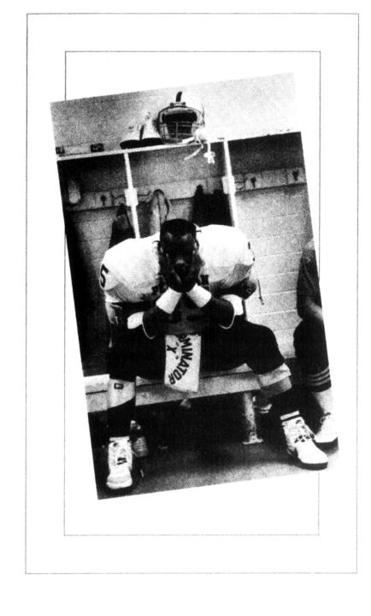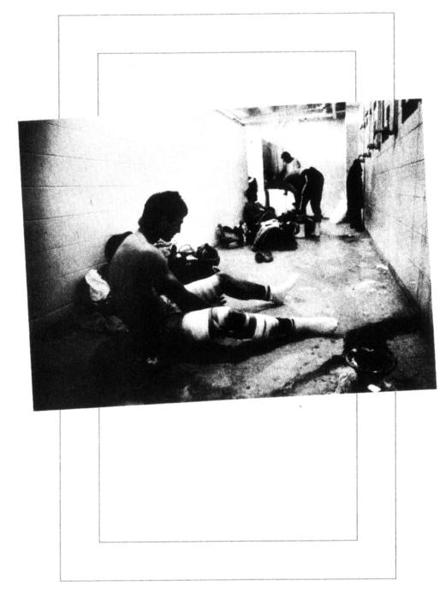Friday Night Lights: A Town, a Team, and a Dream (35 page)
Read Friday Night Lights: A Town, a Team, and a Dream Online
Authors: H. G. Bissinger
Tags: #State & Local, #Physical Education, #Permian High School (Odessa; Tex.) - Football, #Odessa, #Social Science, #Football - Social Aspects - Texas - Odessa, #Customs & Traditions, #Social Aspects, #Football, #Sports & Recreation, #General, #United States, #Sociology of Sports, #Sports Stories, #Southwest (AZ; NM; OK; TX), #Education, #Football Stories, #Texas, #History

There were also times when his undisciplined running style
seemed wilder than ever, as if he was frantically trying, in a
single carry, to make up for an entire season that he knew was
fleeing from him.
 II
II
There was hope now, and bit by bit, with each game, it had
gotten brighter and brighter. It still seemed impossible half the
time but it was there, a glowing speck like the last drop of the
sun on the horizon. Could he cradle it? Could he catch it?
Was it totally ridiculous to think of this skinny, earnest kid
wearing the orange and white of Texas next year? Maybe so.
Even Mike Winchell wondered how he could possibly compete with the studs that he read about over and over in the worn
pages of Texas Football magazine, guys from Hurst Bell and
Denison and Langham Creek who were taller and faster and
stronger, guys with discreet half-smiles on their faces who always looked as if there wasn't a thing in the world that could
ever get to them or rattle them.


Mike himself had a wonderful smile, but it suggested warmth
and innocence, not serene self-confidence in the face of all challenges. "I was kind of an oops," was the way he described his
entrance into the world. Sometimes he half jokingly suggested
that he should have gotten out of football back in Pop Warner
when he was at the top of his game. And yet, on days when he
was feeling good about himself and everything just seemed to
click, he knew he threw the ball with a special gift.
The Abilene Cooper game had been like that. It was all so
wonderfully, effortlessly easy. He already had had several great
games-the opener against El Paso Austin, the one against
Midland High-but this was his greatest. Midway in the first
quarter, when he had seen the Cooper cornerback go into motion before the play started, he knew they were going to be in
man-to-man. He looked for Hanker Robert Brown down the
right sideline and threw the ball crossfield on a dime about
forty yards. Brown caught it in stride for a sixty-two-yard
touchdown. In the second quarter, he lined up and saw the
Cooper secondary once again out of kilter. They were giving
Brown too much cushion, laying off him six or seven yards.
Once again he won the chess match and laid the ball in for a
nineteen-yard touchdown. Still in the same quarter, he lined up
over center and saw Cooper in one-on-one coverage against
Lloyd Hill. That was more idiotic than giving Robert Brown a
seven-yard cushion. The play immediately formed in his mind.
Hill ran a fly pattern and Winchell hit him for a forty-five-yard
touchdown. Still in the same quarter, he backpedaled, saw Robert Brown break free, and threw another touchdown pass, this
one good for eighteen yards.
By the time the first half ended, Winchell had thrown nine passes. Five had been incomplete. The other four had been for
touchdowns. He didn't throw any more passes that night, but it
hardly mattered. Through the first eight games of the season
he had thrown for seventeen touchdowns. Assuming Permian
got into the playoffs, which seemed automatic at that point, he
was destined to break the single-season record for most touchdown passes.
"Michael has had so many strikes against him, and has struggled so hard, you just want to see him succeed," said Deborah
Hargis, a social studies and history teacher at Permian. "There
just aren't a lot of good kids, and he's a good kid."
Like many who met him, she became both intrigued and
enchanted with him. She saw something rare there, and when
she thought of him a particular image often came floating back
to her.
The year before, when he had been in her history class, they
had held a Beautiful Baby contest. Mike brought in a picture
of himself, but it wasn't one of those smiling-from-ear-to-ear
shots taken at Sears or Penney's. Mike had never lived a life like
that. Instead he was holding a piece of gum while a single tear,
like the wispy trail of a jet, fell down his cheek. Mike explained
that he was crying because he had never seen a camera before
and thought it was a gun. Hargis always remembered that picture and the softness of those brown eyes as Mike apparently
thought he would be shot the second the shutter button clicked.
She loved the way he was with children, particularly those
who worshiped him and came to the school pep rallies wearing a jersey with his number, 20, on it. She loved the relationship he had with his grandmother, how he delighted in her
and always watched out for her. She loved the way he was a
klutz off the field despite his enormous athletic abilities, how he
invariably spilled food on himself when he went out to eat or
how when he got up from his desk in class one day he knocked
it over.
There were times when a dark cloud descended over him,
making him virtually silent. His face became filled with a look of sad, aching brooding, as if he was thinking about something
that only he could understand and somehow resolve. But there
were other tines when he became alive and animated, like a
child gingerly touching the edge of the ocean before plunging
in, displaying a curiosity unique among kids who lived in
Odessa.
New York, Philadelphia, the towering cities of the East beckoned to him with the exoticism of stories by Kipling, and he
wanted to know about them, to see if the things he had read in
magazines and saw on television were true. Were there muggers on every corner? Was there really a Mafia? The absolute
lack of guile in his voice as he wondered about places that
seemed to exist in a universe separate from the one he occupied in Odessa, the twinkle of a smile spreading over the
flat contours of his face, made it easy to see why his favorite
book, outside of the sports autobiographies he had read of Jim
McMahon and Ken Stabler and Reggie Jackson, was Huckleberry
Finn. Floating on a raft down the Mississippi to one mysterious
place after another with nothing else around except trees and
water, it beckoned to him. "I could stand to do that, go down
the river," he said.
As he probed and pawed about worlds so different from his
own, something in his own life would suddenly hit him-the
time he had gone deer hunting and had one in his sights but
couldn't bring himself to shoot it; another time when he had
camped out near the Devil's River down around Del Rio; fishing trips on the Pecos, where he and a friend went river rafting
on old tables they had found; the road trip with his brother to
the state high school football championship between Mart and
Shiner. He talked for a minute, or maybe two or maybe even
five, as if something inside him had been punctured, had been
unleashed and come alive again. And then, abruptly, the torrent stopped and his face once again regained its brooding
stare.
Hargis knew there were days when it was best to leave Mike
alone, when he seemed impervious to the emotional gestures of anyone. But there were also clays when her poking and prodding led to a small foothold inside him, a tiny ray of light inside
an intricate cavern with more depth than anyone could possibly
have realized.
She desperately wanted him to make it, as did everyone else
who had ever met him and become aware of some of the tidbits
of his past-the death of Billy, the way he refused to let virtually anyone inside his home, the way he had raised himself.
As Boobie's season became a sad and sour struggle, Mike
Winchell's only continued to rise. As Boobie tried to find the
natural rhythm of the year before, Mike edged closer and
closer to a dream he had quietly harbored for much of his life.
As they headed into the ultimate showdown against Midland Lee, they were two opposites, one plunging so fast he
could barely hold on anymore, the other soaring beyond all
expectations.
Led by Winchell, Permian trampled the Cooper Cougars
56- 14 to push its record to seven and one. Everywhere you
looked that night you saw a star-Winchell at quarterback,
Comer at fullback, Hill at split end, Brown at Hanker, Christian
at middle linebacker, Chavez at tight end-a team so damn
good it hadn't missed a single beat when Boobie had wrecked
his knee and went on without him as if he had never been
there. And every fan couldn't help but believe that the following week's game would be little more than a continuation of the
Cooper obliteration, only a thousand times more sweet.
It was hard to get too worked up over Abilene and the Cooper Cougars. They didn't look down their noses and act as if
Odessa was some sort of primeval desert wilderness with people
whose intellectual capacity fell somewhere between that of the
Goths and the Visigoths. No, there wasn't any reason in the
world to hold a grudge against Abilene.
But the same couldn't be said for Midland, which held a
unique place in the hearts of almost every Odessan. Even the
most liberal ones who had spent a lifetime fighting racial and social injustice and who cherished the notion of open-mindedness drew the line at the Midland border.
"Texans everywhere, except Midland, are tolerant of each
other," said Odessa attorney Michael McLeaish, still smarting
from the time he had gone as a kid to a party in Midland over
at the country club and walked around in it bow tie that began
to feel as big as a ski jump while everyone else looked so cool
and casual. "Midland is a principality. I don't like people from
Midland. They don't like us and we don't like them. I just can't
stand those bastards and they feel the same way about us."

